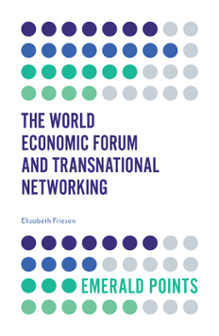
Prelims
The World Economic Forum and Transnational Networking
ISBN: 978-1-83982-459-3, eISBN: 978-1-83982-456-2
Publication date: 30 June 2020
Citation
Friesen, E. (2020), "Prelims", The World Economic Forum and Transnational Networking, Emerald Publishing Limited, Leeds, pp. i-viii. https://doi.org/10.1108/978-1-83982-456-220201001
Publisher
:Emerald Publishing Limited
Copyright © 2020 Emerald Publishing Limited
Half Title
The World Economic Forum and Transnational Networking
Title Page
The World Economic Forum and Transnational Networking
By
Elizabeth Friesen
Carleton University, Canada

United Kingdom – North America – Japan – India – Malaysia – China
Copyright Page
Emerald Publishing Limited
Howard House, Wagon Lane, Bingley BD16 1WA, UK
First edition 2020
Copyright © 2020 Emerald Publishing Limited
Reprints and permissions service
Contact: permissions@emeraldinsight.com
No part of this book may be reproduced, stored in a retrieval system, transmitted in any form or by any means electronic, mechanical, photocopying, recording or otherwise without either the prior written permission of the publisher or a licence permitting restricted copying issued in the UK by The Copyright Licensing Agency and in the USA by The Copyright Clearance Center. No responsibility is accepted for the accuracy of information contained in the text, illustrations or advertisements. The opinions expressed in these chapters are not necessarily those of the Author or the publisher.
British Library Cataloguing in Publication Data
A catalogue record for this book is available from the British Library
ISBN: 978-1-83982-459-3 (Print)
ISBN: 978-1-83982-456-2 (Online)
ISBN: 978-1-83982-458-6 (Epub)


Contents
| List of Figures | vi |
| Foreword | vii |
| 1. Introduction | 1 |
| 2. Organisation and Activities | 21 |
| 3. How the WEF Became a Transnational Political Actor | 51 |
| 4. Transnational Politics in Practice | 95 |
| 5. Conclusion | 123 |
| Reference | 133 |
| Index | 163 |
List of Figures
| Fig. 2.1. EMF/WEF Themes 1984–2019. | 25 |
| Fig. 2.2. WEF Platforms 2019. | 39 |
| Fig. 2.3. WEF Communities 2019. | 40 |
| Fig. 2.4. WEF Global Future Councils 2019. | 41 |
Foreword
I first became aware of the impact of the World Economic Forum (WEF) while tracing the progress of the transnational civil society campaign for the cancellation of third world debt, a campaign which culminated in the adoption of the Multilateral Debt Relief Initiative at the G8 in 2005. I chose the case of the campaign for the cancellation of third world debt because I was interested in theories of power. The power of the liberalised international financial system to shape not only international economic relations but also economic, political, and social realities within states seemed to me to be unprecedented in its scope and scale. Following Polanyi, I wanted to explore the kinds of power societies might bring to bear in response.
This eventually led me to the transnational civil society campaign for the cancellation of third world debt (Friesen, 2009, 2012). As I traced the origins and activities of the national and transnational civil society actors, organisations, and networks involved in this campaign, I became aware of the somewhat surprising role the WEF had played in this process. There is very little analysis of the WEF as a transnational political actor and I believe this is a serious oversight. The WEF is an increasingly engaged and well-connected transnational actor in the global political economy. The innovative transnational politics practiced by the WEF are not formally legitimised by states but they are underpinned by unconventional sources of power and influence. At present, the norms and formal institutional structures of the international order appear to be eroding and research into transnational politics and non-state sources of resilience in the international political economy is particularly relevant. The WEF is an unusual transnational organisation with unique capabilities. It is energetic, ambitious, innovative and now more determined than ever to take a part in addressing the most challenging issues in world politics.